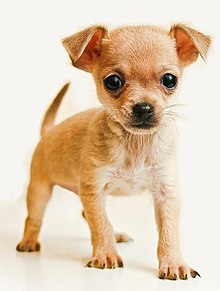Chihuahua

| Description
The Chihuahua is a tiny toy sized dog. The
body is longer than it is tall. The head is well rounded, apple in
shape and the muzzle is short and pointed with a well defined stop.
Puppies have a soft spot on the top of the skull called a "molera",
which
usually closes by adulthood. The large, round eyes are set well apart and are dark,
ruby, and may be lighter in white dogs. The erect ears are large.
Dewclaws may be removed. The tail is long, sickle-shaped, either curled
over the back or to the side. The coat comes in both a short coat or a
long, wavy or flat coat. All colors, both solid, marked or splashed are
accepted. Colors include, but are not limited to, black, white,
chestnut, fawn, sand, silver, sable, steel blue, black & tan and
parti-color.

TemperamentThe Chihuahua is a good companion dog.
Courageous,
extremely lively, proud and adventurous, they enjoy affection. Brave,
cheerful and agile. Chihuahua's can be strong-willed without the proper
human leadership. They are loyal and become attached to their owners.
Some like to lick their owner's faces. Socialize them well. For some, they may
be slightly difficult to train, but they are intelligent, learn quickly, and
respond well to proper, firm but gentle (positive reinforcement) training. May be difficult to housebreak. Do not let the Chihuahua get away with things you would not allow a large dog to do (Small Dog Syndrome), such as jumping up on humans.
While it may be cute for a 5 pound tiny dog to put his paws on your leg
when you come home from work, it is allowing a dominant behavior. If
you allow this little dog to be your pack leader
they will developed many behavior issues, such as jealousy, aggression
with other dogs and sometimes with humans, and will become undeniably
suspicious of people except for their owner. When strangers are
present, they
will begin to follow their owner's every move, keeping as close as
possible. A Chihuahua who is pack leader of their humans may snap at
children. This breed is generally not recommended for
children, not because they are not good with them, but because most
people treat the Chihuahua differently than they would a large dog,
causing them to become untrustworthy. Because of their size, this breed
tends to be babied and things we humans clearly see as bad behavior for a
large dog is looked over as cute with a small dog. Small dogs also tend
to be walked less,
as humans assume they get enough exercise just running around during
the day. However a walk provides more than just exercise. It provides
mental stimulation, and satisfies the migration instinct, all dogs have.
Because of this, small breeds such as the Chihuahua tend to become
snappish, yappy, protective, and untrustworthy with kids and humans they
do not know. Chihuahua's who are their human's pack leader tend to be
fairly dog-aggressive. An owner who realizes this and treats the
Chihuahua no differently than they would a large breed, becoming a clear
pack leader, will get a different, more appealing temperament out of
this wonderful little dog, finding them to be good little child
companions.
Height, WeightHeight: 6-9 inches (15-23 cm.)
Weight: 2-6 pounds (1-3 kg.)
Health ProblemsProne to rheumatism, slipped stifle, colds,
and gum problems. Also corneal dryness and
secondary glaucoma, do to their protruding eyes. Gains weight
easily. Take caution around toxic products such as chocolate or
fertilizer.
This is a very small breed and it will not take much to poison them.
Chihuahuas are often born via cesarean section because puppies are born
with relatively large heads. Susceptible to fractures and other
accidents in puppyhood. Some Chihuahuas have a molera, an unclosed
section of the skull which can remain open
throughout life. This makes the dog prone to injury. Has a tenancy
to
wheeze and snore, because of their small, short muzzles. Prone to stress,
caused by the owners tendency to treat them like little babies. All
dogs, even tiny ones, need to feel their owners are strong minded beings
able to handle the entire pack.
Living ConditionsThey are good
little dogs for apartment life. The Chihuahua likes warm weather and
dislikes the cold. They need space just like any other dog. Because they
are small does not mean they can be kept in a vary small area.ExerciseAlthough it is tempting to carry these dainty
creatures about; these are active little dogs,
who need a daily walk.
Play can take care of a lot of their exercise needs, however, as with all
breeds, play will not fulfill their primal instinct to walk. Dogs who do not get
to go on daily walks are more likely to display a wide array of behavior problems, as well as neurotic issues. They will
also enjoy a good romp in a safe open area off lead, such as a large fenced in
yard.
Life ExpectancyAbout 15 or more years.
GroomingThe smooth, short-haired coat should be gently
brushed occasionally or simply wiped over with a damp cloth. The long coat
should be brushed daily with a soft bristle brush. Bathe both types about once
per month, taking care not to get water in the ears. Check the ears regularly
and keep the nails trimmed. This breed is an average shedder.OriginThis is the oldest breed on the American
continent
and the smallest breed in the world. Native to Mexico, where it
received it's name from the Mexican State of Chihuahua. It was only
brought to Europe at the end of
the nineteenth century. What breeds were used to make up the
Chihuahua are unclear, but some think it originated from the Fennec Fox.
The dogs were sacred to Pre-Columbian Indian nations and were also
popular pets to the upper class. The dogs are prized for their size and
are most valued to some fanciers when they weigh under 2-1/4 pounds (1.3
kg.).
|



